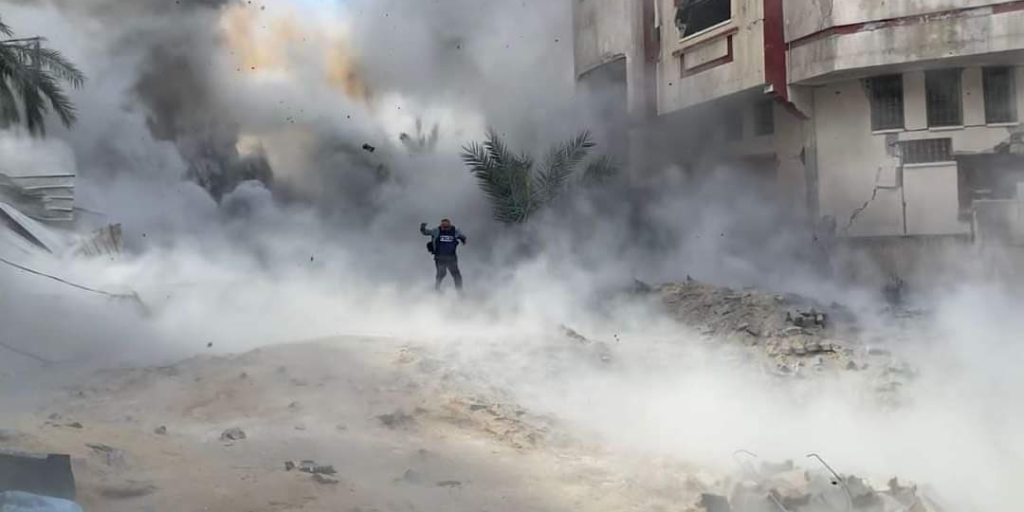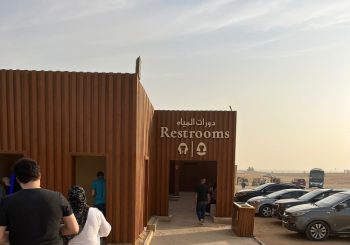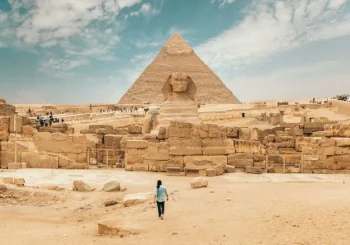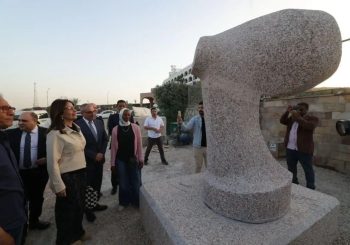With the war on Gaza entering its sixth week, the continuing bombardments on Al-Shifa Hospital and other medical facilities in the north continue to raise alarms, with the World Health Organization unable to reach its contacts at the hospital. Regional tensions seem to be reaching a boiling point as Israeli Minister of Defense Yoav Gallant threatens Lebanon’s Hezbollah to repeat what is being done in Gaza to Beirut.
LIVE UPDATES
Update 7: The Palestinian Red Crescent Society (PRCS) announced on 12 November that Gaza’s Al-Quds Hospital is no longer operational, with the cause being a depletion of available fuel and continuous power outages.
“PRCS holds the international community and signatories of the Fourth Geneva Convention accountable for the complete breakdown of the health system and the resulting dire humanitarian conditions,” the PRCS stated in their announcement.
Al-Nasr and Al-Rantisi children’s hospitals are besieged, with tanks spotted in front of Al-Rantisi yesterday.
Update 6: With hostilities between the Israeli Defence Forces and Hezbollah increasing over the past weeks, Israel’s Minister of Defence Yoav Gallant warned that Lebanon is being “dragged” into the war by the Shi’a Islamist group. Gallant’s comments, which came in a speech to IDF soldiers on 11 November, also included threatening Lebanon’s capital city – “What we can do in Gaza, we can also do in Beirut,” Gallant remarked.
Update 5: Shortly after declaring a loss of communication with Al-Shifa Hospital, the World Health Organization’s (WHO) Director-General Tedros Ghebreyesus called for an immediate ceasefire in light of the rising death toll and destruction of medical facilities. This is the second time the multilateral health organization called for a ceasefire since the outbreak of the war on 7 October.
Update 4: The World Health Organization’s (WHO) Regional Office for the Eastern Mediterranean announced on 12 November that all communication with its contacts in Al-Shifa Hospital was lost due to the ongoing airstrikes. The health agency assumes the contacts evacuated the premises but there are reports that some who fled were shot at and killed.
Update 3: Australian Minister of Foreign Affairs Penny Wong called on Israel to uphold international law and exclude medical facilities from attacks. In an interview with ABC on 12 November, Australia’s top diplomat called the war “one-sided” and expressed a “deep concern” for the worsening humanitarian situation. Despite Wong’s referral to international law, she stopped short of calling for a ceasefire.
Update 2: The United Nations Development Programme (UNDP) revealed that one of its compounds in Gaza City – which is acting as a shelter for staff members and displaced citizens – was bombed late at night on 11 November. The shelling resulted in several deaths and injuries, although the exact number remains unclear.
Update 1: In a televised address on 11 November, Israeli Prime Minister Benjamin Netanyahu reiterated that a ceasefire would only be possible if all 239 hostages held by Hamas in Gaza were released. In the same address, Netanyahu declared that after the war, Gaza would be demilitarized and Israel would retain security control there – a statement that runs against previous assertions by the United States to avoid any Israeli reoccupation of the territory. The Israeli Prime Minister also rejected proposals to have the Palestinian Authority govern Gaza during its post-war transition.
THE CONFLICT SO FAR
After a surprise attack conducted on 7 October by Hamas on a number of southern Israeli towns which resulted in the deaths of an estimated 1,200 people and more than 220 being taken hostage by Hamas, Israel launched a retaliatory bombing campaign against what it describes as ‘terrorist targets’ in the Gaza Strip.
Over 11,100 Palestinians have been killed in the Gaza Strip — including at least 4,506 children — and over 27,000 others injured. Meanwhile, at least 183 Palestinians have been killed in the West Bank and at least 2,200 have been injured.
The priority of the Egyptian government since the beginning of the conflict has been deescalation and the securing of a path for aid to enter the Gaza Strip through the Rafah crossing. Israel bombed the crossing at least six times, and limited aid trucks have crossed to Gaza so far, which UN officials warn is insufficient amid dire humanitarian conditions.
Most Western countries, with the United States at the forefront, have expressed unconditional support for Israel, despite the steadily rising death toll in Gaza. Meanwhile, the United Nations General Assembly has issued a resolution calling for a ceasefire.







Comments (0)